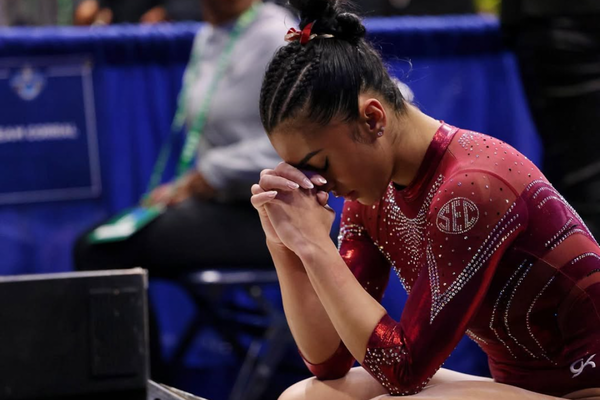

Every road leading to success comes with challenges. A 23-year-old US-born Colombian gymnast knows that very well. Before the US Olympic Gymnastics trials, she had her ticket to enter the Paris Olympics. How? She chose Columbia to confirm her berth in the Olympics. Emulating her idol Laurie Hernandez’s steps, she wanted to promote Latinos through her participation. But she faced roadblocks. The stereotype haunted her. She had to hear questions about her actual ethnicity. That’s not all. Before the Olympics, the lack of career opportunities as a gymnast worried her. After completing her graduation from the University of Alabama, she was left with little option to make a career.
Altogether, Luisa Blanco had so many reasons to crumble. But she stood firm. She appeared in the Olympics and made her name. Any special motivation apart from confidence and determination? Yes. The 23-year-old tasted something bitter in her early life. The experience taught her one or two things about embracing things.
ADVERTISEMENT
Article continues below this ad
The slip-up in early life led to a complicated situation
On January 7, GymCastic uploaded a video on YouTube. It displayed the interview with Luisa Blanco. In the entire tête-à-tête, the former NCAA balance beam champion opened up about several things. However, in one such moment, she narrated the dark phase of her life. No, it wasn’t from her elite gymnastics phase. Instead, it was from her early college years.
According to her, in those years, she had been in a toxic relationship. The bonding with the other one led her to come under the immense pressure of expectations. For her, it was too massive to handle. The experience of suffering made her claim, “It was just like somebody who was just expecting too much of me and I felt like I was their happiness and I’m like, this is not healthy and I felt like I could take it all in.” Luisa had no option left except to take therapy.

“I need to go to a sports site. I need to start therapy,” Blanco said. In the next second, the gymnastics phenom added, “I need to talk to my coaches and let them know what’s going on outside the walls of Coleman Coliseum.” In those years, the added pressure of the curriculum in Alabama deteriorated her mental condition. The therapy, however, came as a blessing for her. She started to see things through a different lens and thus the world stood in front of her, full of opportunities.
What’s your perspective on:
Did Luisa Blanco's choice to represent Colombia redefine her legacy in gymnastics?
Have an interesting take?
“My world just kind of opened up because it showed me that you really can trust people,” Blanco said. But there’s no tough task to complete growing trust in people. The Los Angeles-born revealed, “You have to be selective with who you trust but people who truly love you and are there to support you as a person like it truly is genuine.”
Ultimately, she explained the entire situation as a pure example of the domino effect, where her openness made the world fall for her. But did the therapy help her in overpowering the painful chapter fully?
The success followed the gymnastics star on the way
Before moving to the Paris Olympics, Luisa Blanco said, “Part of me wants to do gymnastics forever. It’s something that is not easy to walk away from.” Additionally, she had a fear factor settled in her. It was connected to her ethnicity, something that she wanted to represent on the global platform. In her interaction with olympics.com last year, the former Alabama gymnastics standout laid out, “I thought I wouldn’t get far because I was Latina, because that’s what society told me… I always had to work a little harder… I had something to prove to the world.”
ADVERTISEMENT
Article continues below this ad
A factor like this wasn’t new for her. Instead, it made her place in her mind for a long time. She confirmed that part of the story, saying, “That’s what pushed me throughout my career.” But wasn’t the same issue once keeping her in the shell? Yes, she feared mixing up with the world and kept settling on her toxic relationships. Then what was the positive impact of the therapy?

ADVERTISEMENT
Article continues below this ad
Having conquered every hurdle, Luisa Blanco competed for Colombia at the 2024 Paris Olympics. During the qualification round, she placed 30th in the all-around; however, because of the two-per-country rule, she secured the 24th and final position in the all-around final. Now, she is the first artistic gymnast from Colombia to qualify for an Olympic final. Thus, she represented her Colombian ethnicity at the highest stage of gymnastics. She couldn’t be another Laurie Hernandez in US Olympic history. But she became the first Luisa Blanco in her native region’s history. And that has to be worth something, doesn’t it?
ADVERTISEMENT
ADVERTISEMENT
ADVERTISEMENT
ADVERTISEMENT


Did Luisa Blanco's choice to represent Colombia redefine her legacy in gymnastics?